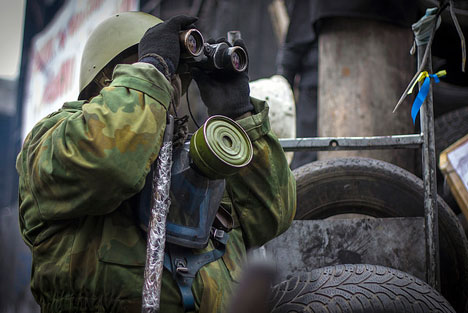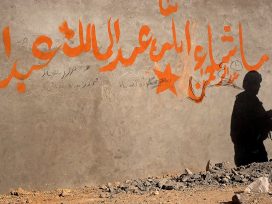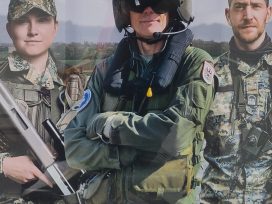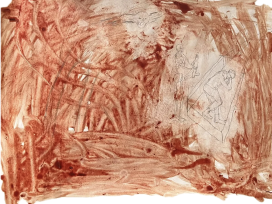On 22 February 2014, my friend and I met a Catholic priest from the Maidan in the subway. That is, he was a “Catholic priest from the Maidan” on 22 February. I knew him before as a “priest from Facebook.”
We spoke with the “priest from Maidan” about Yanukovych’s ousting and exchanged smiles, looking at one another’s armoured vests: ours under the jackets and his over the soutane. The “priest from Maidan” had been standing on stage for a couple of days before, granting absolution to the wounded, when the fire line literally approached it. He really needed an armoured vest.

Protester on Hrushevsky Street, Kyiv, 8 February 2014. Photo: Christiaan Triebert. Source:Flickr
The “priest from Facebook” used to be a harsh supporter of the ban on abortions. I don’t remember his position concerning same sex marriage, but I can imagine it. The “priest from Facebook” and I held dramatically opposing views on life and death. Yet I believe that the “priest from Maidan” and I might have eventually agreed on life and death, if we didn’t have to get off the train.
It seems that the dichotomy between being “from Facebook” and being “from Maidan” didn’t exist for him and existed only for me. This example is not unique; it’s rather characteristic of our epoch. The challenge we face today is not only a hybrid war, but also a hybrid peace. Under such a peace almost nothing is certain enough to rely upon, and only a few things are undoubtedly certain. Hybrid peace transforms our lives into a series of paradoxes.
Sometimes we are annoyed with updating the software we use. What we, users, see as a discomfort and the fault of the developers is, in fact, an inherent characteristic of the system, the scope and complexity of which we do not see and cannot comprehend in most cases. It’s impossible to avoid failures in complex systems, but they are constantly sought for, in particular, by “bad guys.” However, the majority of users are unaware of that. Periodical updates are a feature of any healthy system and, in the case of our computers, a component of our security.
Similarly, we are unable to gain an overview and assess the complexity of causes and consequences in large social transformations. We stand too close to see the whole picture. One cannot stand at the ground zero of an uprising and make valid generalizations about it. As with software, our conventions require constant updates. Someone is angry at soccer fans and “street radicals”; nevertheless, were it not for their actions on 19 January on Hrushevsky Street, I might not be writing these lines now or I might be writing them in emigration (an optimistic scenario). Someone may be angry with “bystanders”; nonetheless, if thousands of “bystanders” had not come over from the Maidan and backed the “radicals” from the Dynamo stadium to European Square in Kyiv, then, once again, I might not be writing these lines today.
Therefore, one of the most important lessons of Maidan is to learn not to judge others, as we almost never have sufficient and full information for that. For example, not to judge the well-dressed people in restaurants, when you see them on your way to the Maidan, wearing your ski suit that you have not taken off for a month or so – because you don’t know whom these people are rescuing from pre-trial detention facilities, speaking on their mobile phones in that restaurant, how much fuel they have donated to Maidan today, or how much money they transferred to the activists. That is, how many people they have warmed, fed, treated and saved. Back then, in the winter, we saw how those who had accumulated wealth using the corrupt system were gave their money away to achieve victory over the system. We saw how people who have never attended rallies rescued others from the “Berkut” police with nothing but their bare hands. How people who had never spoken Ukrainian in their life proudly called themselves “Banderites”. How people who had thus far been simple bystanders all their lives – panel games, karaoke at corporate parties, more or less moderate payoffs – became heroes.
And then the war began and everything got even more complicated. At some point it seemed that experience was the only reliable point of reference, and this approach proved very tempting. For example, in the winter, we were getting angry at kind-hearted western Europeans who were sincerely awestruck by the fact that we couldn’t just file a petition to ask Yanukovych to leave amicably, instead of throwing Molotov cocktails at the police who are also our fellow citizens! “You know, our police are just as terribly brutal, too!” they said.
We had to realize that the most extreme experience of such well-wishers had been smoking a joint or a drinking party in their dorm. Realizing that made it easy to breathe and relax, and to calmly explain the experience of Vradiyivka and the role of police in the life of Ukrainians. Nothing personal, people have the right not to understand: it’s a unique development, and a unique combination of circumstances. Assuming distance allows one to react calmly to misunderstandings, indifference and, sometimes, even to doctrinal preaching. Experience also separates us forever. The experience of the Maidan, especially of its last days in February, has separated those who were there and those who weren’t. The experience of those who were in the area of the Anti-Terrorist Operation (ATO) has forever separated them from those without such an experience.
Sooner or later, it will all end. And yet the most absurd thing right now would be to make forecasts and plans. However, some things are certain (unless there is a nuclear winter).
Firstly and most importantly, sooner or later, people will return from the East, people with guns and knowledge of how to use them, who have suffered losses and post-traumatic disorder. People with unique experience.
Yet no experience saves you from mistakes. No experience enables you always to draw correct conclusions, or even to adequately interpret the immediate reality. Heroes make mistakes. Widows and victims make mistakes. Everyone makes mistakes. However tempting the idea of delegating notions of good and evil to the veterans might be, it’s still infantile to do so. A courageous warrior may not understand macroeconomics, and the sense of justice acquired under extreme conditions can prove fatally erroneous when applied to utility bills.
My profession allows me to claim with confidence that reading a vast number of books does not always make people wiser, however paradoxical it might sound. Lately I also came to believe that even the most extreme trials do not always allow for unfailingly correct distinctions between good and evil. Even those who have looked the death in the face might be wrong in their judgments.
Today, I read moving texts full of compassion for the residents of the ATO zone, which conclude that we only have to show them that we are neither beasts nor fascists: if everyone just saw that, everything would be fine. Ethically impeccable and absolutely unrealistic! Face-to-face communication in groups of over 150 is generally problematic. I read about a negotiator who rescues hostages, but the combination of other circumstances – from his past to the dubious way in which he climbed up the military ladder – is crying out “FSB”.
There will always be a counterargument – the testimony of witnesses, the results he achieved (rescued hostages). It seems that, yet again, there is nothing certain to rely on.
I see only one way out of these painful contradictions. If we think in categories of the current moment, here and now, of individual lives saved, then we should consistently stick to the extent of the compromise made, without extending it to broader contexts. An FSB officer can save some people but, surely, he cannot determine our everyday agenda. He doesn’t get to teach us what is right and what is wrong, and how we should manage our affairs in Ukraine. Otherwise all of us would be taken hostage, not only those held in dungeons by the terrorists right now. I understand that I am exposing myself to criticism, but even those whom we can supposedly trust may – and have the right to – be deceived and mistaken, draw incorrect conclusions and make unfair accusations.
It is hard to argue against heroes, without having realized and – most importantly – without having agreed with each other that to argue against them does not mean to dishonour them. What is required is not only the separation of judgment from emotion – something even citizens of more affluent and safe countries seldom achieve – but also the ability to resist reproaches that start with “you there, behind the front line…”
This brings me back to the second thing that is undoubtedly certain: this war is revenge for our chance for success, for the fact that the world – perhaps for the first time – looked at us in admiration.
This is not a territorial war. Clearly, while “Crimea-is-ours” warms the imperial soul, Putin does not need Sloviansk – he needs Kyiv. That does not necessarily mean Russian tanks on the Maidan. It rather means a return to the previous arrangements, where Kyiv is a city of Kremlin puppets and of amusing gawky “khokhols” who even start celebrating the New Year one hour earlier, “at Moscow time”. The largest threat for Putin and his regime is a Kyiv with competent institutions, global ambitions, a friendly environment, transparency and effectiveness. Even those in Russia who seem sympathetic towards us today like to see us as a victim, an object: “there lay blood-stained unconscious Ukraine, and Crimea sticks out of her handbag.”
They did not forgive us for our chance for success, nor will they forgive us for our success in the future. There will be the dirtiest and most devious attacks on our consciousness, trust and infrastructure; there will be intimidation, populism and intrigues. “Hawks” will do everything they can for us to fail; “doves” will anticipate our fall with a sweet foretaste.
To be successful as a country is no less important than to repel an attack. In categories of revenge for the fallen, the war is taking place not only on the front line, but equally in air-conditioned offices. It is more important today to allow yourselves and your loved ones to be successful, to appreciate their contribution to the country’s success than to blame others for leading a peaceful life despite the warfare taking place elsewhere in the country. To be successful is a matter of honour. Let the perpetrators choke on their bile.







